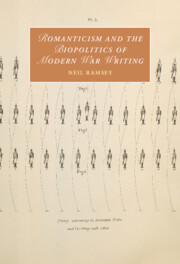Book contents
- Romanticism and the Biopolitics of Modern War Writing
- Cambridge Studies in Romanticism
- Romanticism and the Biopolitics of Modern War Writing
- Copyright page
- Contents
- Acknowledgements
- Introduction
- 1 Writing and the Disciplinarisation of Military Knowledge
- 2 Strategy in the Age of History
- 3 Robert Jackson’s Medicalisation of Military Discipline
- 4 More a Poet than a Statesman
- 5 Thomas Hamilton’s Wordsworthian Novel of War
- Afterword
- Bibliography
- Index
- Cambridge Studies in Romanticism
Introduction
Romanticism and the Bio-aesthetics of the Military Literary World
Published online by Cambridge University Press: 25 April 2023
- Romanticism and the Biopolitics of Modern War Writing
- Cambridge Studies in Romanticism
- Romanticism and the Biopolitics of Modern War Writing
- Copyright page
- Contents
- Acknowledgements
- Introduction
- 1 Writing and the Disciplinarisation of Military Knowledge
- 2 Strategy in the Age of History
- 3 Robert Jackson’s Medicalisation of Military Discipline
- 4 More a Poet than a Statesman
- 5 Thomas Hamilton’s Wordsworthian Novel of War
- Afterword
- Bibliography
- Index
- Cambridge Studies in Romanticism
Summary
The introduction outlines the central argument of this study, that military literature was of vital importance to the cultural understanding of warfare in the Romantic era. Locating military writing in relation to the massive expansion of print of the latter half of the eighteenth century, it also delineates the theoretical basis of the study in Jacques Rancière’s theorisation of indisciplinarity, or a poetics of knowledge. Concerned with how a science assumes authority over a domain of knowledge, an indisciplinary approach means asking how military thought was able to position itself as a science and assume authority over war discourse. At the heart of this was the growth of a new disciplinary regime that conceptualised the disciplined subject in terms of what Michel Foucault describes as the ‘natural body’, a biopolitical body of vital, living forces, a body informed by inner depths and potentials that resist the imposition of ‘mechanical’ authority. The introduction concludes by observing the striking yet inverted parallels between Romantic concerns with the living body and the sublimity, genius, organicism, perceptions and force associated with this new conception of war that place the state’s war machine in a strangely transposed relationship with Romantic aesthetics.
Keywords
- Type
- Chapter
- Information
- Publisher: Cambridge University PressPrint publication year: 2023

